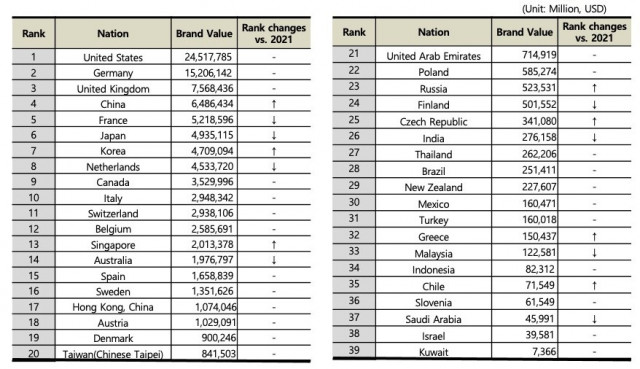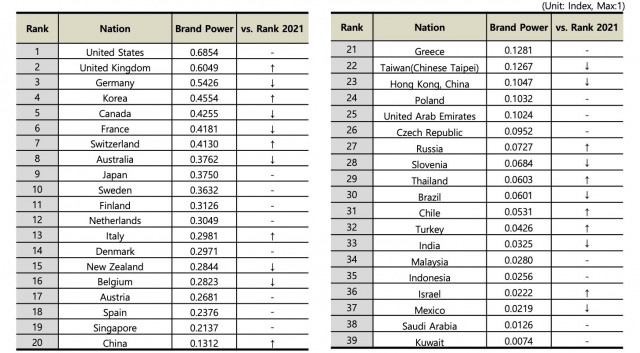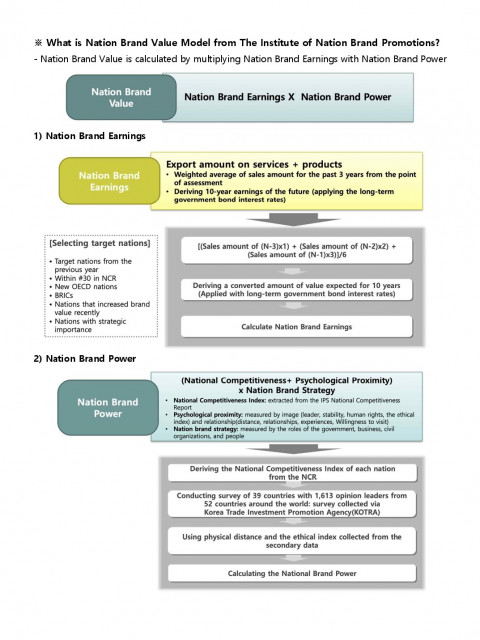2022 Nation Brand Value Ranking Released: Nation Brand Power as a Central Role
INBP’s NBV Ranking is the world’s only empirical research which calculates the NBP and NBV of most, if not all, major countries in the monetary terms. The base data of this research were collected from 1,318 respondents in 62 countries. Each respondent was asked to evaluate each of the 39 major countries on 12 issues. INBP conducted this research for 20 consecutive years since 2002.
UNITAR Chief Jonas Haertle has initiated and supported the research. INBP Chair Dong-sung Cho, Emeritus Professor at Seoul National University Business School, made the presentation.
The importance of Nation Brand Power: Cases of Korea and China
To achieve a high score on NBV, a nation must have high Nation Brand Earnings (NBE) and Nation Brand Power (NBP), as NBV is a result of NBE multiplied by NBP.
NBE is 10-year aggregated figures of a nation’s exports of products and services, assuming the effect of NBP lasts at least 10 years.
NBP is determined by the following formula: Adding National Competitiveness (NC) and Psychological Proximity (PP), and multiplying this by Nation Brand Strategy (NBS). In a word, a nation’s brand power is determined by both economic and non-economic factors and the nation’s integrated efforts to foster it.
For example, Korea was able to climb its NBV ranking by one to the seventh (7th). This performance was driven by the increase in NBP from the eighth (8th) in 2020 and the sixth (6th) in 2021 to the fourth (4th) in 2022, and successfully maintaining its prowess in NBS at the fourth (4th) consecutively in 2021 and 2022.
PP is determined by a nation’s image and its relationship with other nations. Image is composed of the nation’s leadership, human rights, morality and stability. Relationship is composed of distance, past relationship, current relationship, experience, and willingness to visit as perceived by people outside of the nation.
Among the five elements that determine the relationship, Korea ranked the first (1st) in Current Relationship, the fourth (4th) in Past Relationship, and the sixth (6th) in Willingness to Visit, which all led to the rise in PP from the fourteenth (14th) in 2021 to the eleventh (11th) in 2022.
NBS is determined by four strategic entities of a nation: people, business, civil organizations, and government.
Korea’s People, Business, and Government were all highly valued as strategic entities in implementing NBS. People were steadily ranked the third (3rd) and Businesses the fourth (4th) over the past three consecutive years. The Government climbed from the sixth (6th) to the fourth (4th), due to the globally recognized government’s effective leadership during the Corona pandemic.
China took the first (1st) in Nation Brand Earnings (NBE) with USD 49 trillion, but ranked the twentieth (20th) in NBP, which resulted in the fourth (4th) in NBV. China’s fall in NBP was mostly driven by low PP at the thirty-third (33rd) and stagnant NBS at the twentieth (20th) over the recent two years.
Ranking results show how to improve Nation Brand Strategy: A Case of Switzerland
The result of this research allows any of the 39 nations studied to establish a set of strategies to enhance their NBV in the future. For example, Switzerland’s NBV has been stagnant at the eleventh (11th) for the past three years. Switzerland scored very high on Psychological Proximity (5th), much driven by positive images associated with human rights at the top (1st), stability at the top(1st) and morality at the sixth (6th). However, its evaluation on strategic entities’ roles in implementing NBV remained relatively low, resulting in the twelfth (12th) in people, the eighth (8th) in businesses, and the ninth (9th) in government. Moreover, this evaluation on NBS remained stagnant for the past 10 years without much improvement. Thus, Switzerland’s relatively low NBV at the eleventh (11th) due to its low NBS components (12th, 8th, and 9th) in spite of its high PP components (1st, 1st, and 6th) suggests that Switzerland can enhance NBV through better NBS led by people, businesses, and government.
This research result also shows NBP of any of the 39 nations as perceived by 4 regions of Americas, Asia, Europe and Africa, and also by 62 countries. Switzerland, for example, received relatively high PP scores from Americas with 5.10 and Europe with 5.14, compared to low PP from Asia and Africa with the identical 4.94. Breaking down to specific components, a different picture emerges. From Asia, Switzerland received a high image score with 5.17 and a low relationship score with 4.76. From Europe, it received a low image score of 5.11 and a high relationship score of 5.16. Apparently, Asians have more favorable image on Switzerland, without close relationship.
Similar analyses and cross-country comparison can be performed at the country level. There are mutually high PPs between Switzerland and Northern European countries of Sweden, Denmark, UK, Germany and Finland. There are mutually low PPs between Switzerland and Russia. Switzerland has one-sided high PP toward Greece, Italy and Spain. India, Singapore and Japan have one-sided high PP toward Switzerland. In order for Switzerland to improve its overall PP worldwide, it should put efforts in improving its relationship with the countries which have low PPs with Switzerland.
About INBP
The Institute of Nation Brand Promotion (INBP) is a non-profit organization established on November 27, 2013 under the auspices of the Ministry of Culture, Sports and Tourism.
INBP is specialized in research on evaluation of nation brand powers and nation brand values of major countries in the world, consultation on government strategies to promote nation brand, and seminars and conferences to raise awareness of nation brand and to exchange ideas among leaders and scholars in the field.
Website: http://www.nbp.or.kr/
Contact
UNITAR
Chief
Yonas Haertle
Send Email
INBP
Chair
Dong-sung Cho
Send Email
Chief Economist
Hyunjee Hannah Kim
Send Email
This news is a press release provided by The Institute of Nation Brand Promotion.




